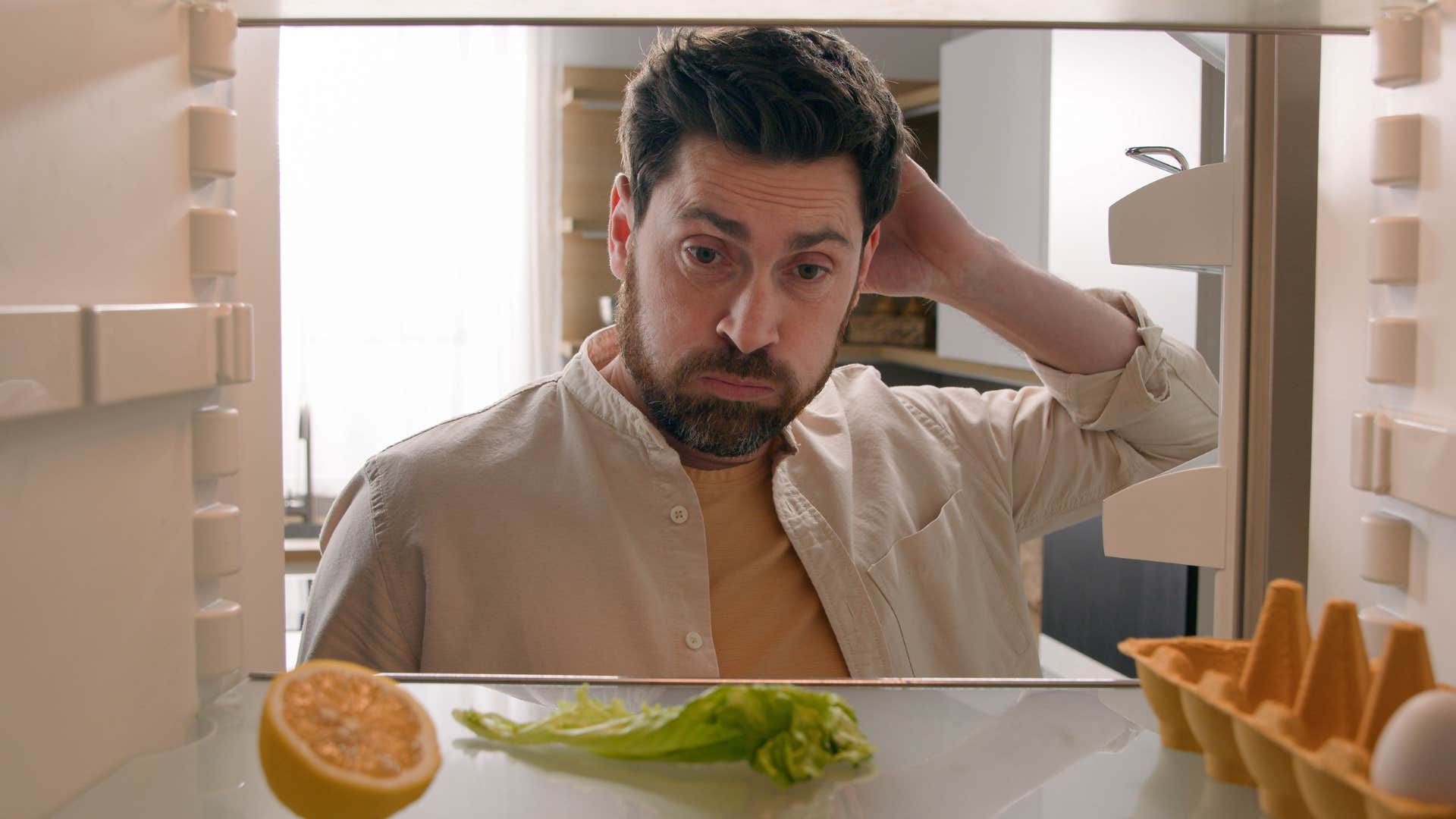11 Things In Someone's Home That Instantly Reveal They’re Not Emotionally Mature Yet
Becoming an adult and having adult things doesn't mean you are one.
 Look Studio | Shutterstock
Look Studio | Shutterstock Emotional maturity isn't just about how someone handles conflict or communicates with others — it's also reflected in the space they live in. While it often shows up in relationships, habits, and behavior, there are also subtle signs around the house that can reveal a person’s level of emotional growth. From unfinished chores to impulse buys, someone's home can tell you a lot about how they manage their feelings, responsibilities, and sense of self.
While everyone expresses emotional maturity differently, it's usually reflected in how well someone manages their emotions, understands themselves, and maintains a balanced view of life, taking care of both their mind and body. Building emotional maturity not only helps improve mental health but also reduces stress, creates opportunities for healthier relationships, and ultimately leads to a more rewarding life. While relationships and conversations help gauge emotional maturity, qualities in a person's home—such as decor, clutter, and interests—can reveal their mental state more than direct interaction.
Here are 11 things in someone's home that instantly reveal they're not emotionally mature yet
1. Chores that are always halfway done
 New Africa | Shutterstock.com
New Africa | Shutterstock.com
According to counselor Julia Kristina, one of the defining traits of an emotionally immature person is their inability to accept accountability and responsibility for their actions. They tend to avoid owning up to their mistakes, offering genuine apologies, and even occasionally rely on behaviors such as adopting chronic victimhood or blame-shifting to cope with their internal discomfort.
In their personal life, they may be avoiding responsibility in similar ways — even if nobody else is around to notice. From completing daily chores to following a routine, they may fall into patterns of inconsistency and instant gratification, which manifest in clutter, half-finished tasks, and a general aura of messiness at home.
So, if you walk into someone’s home and notice a pattern of dishes in the sink, heaps of laundry overflowing in their room, or even mounds of unopened mail in their entryway, it could be one of the signs that they’re not emotionally mature yet.
2. Clutter that never gets addressed
 PeopleImages.com - Yuri A | Shutterstock.com
PeopleImages.com - Yuri A | Shutterstock.com
While clutter isn’t always an instant giveaway of emotional maturity — in some cases, other struggles with ADHD, attention, chronic stress, or time management could prompt more messiness in a living space — it can be one of the things that they struggle with in their homes.
For example, an emotionally dysregulated person may struggle to maintain a sense of peace, cleanliness, and calmness in their space, allowing clutter to pile up, bringing stressful energy into their home, and even avoiding chores and tasks that could create a better ambiance. Truly mature people possess the emotional regulation skills to complete tasks even when they’re stressed or unmotivated, relying on self-discipline and compartmentalization to fulfill their responsibilities.
3. A mountain of empty takeout containers
 Lysenko Andrii | Shutterstock.com
Lysenko Andrii | Shutterstock.com
Outside of simply accumulating clutter and trash that could be easily taken care of at home, mounds of empty takeout containers are also generally signs of an emotionally immature person, particularly in terms of nutrition and personal health.
Emotional maturity is as much about taking care of physical well-being as it is about mental health, so overeating processed foods lacking in nutrition can be a sign of a person avoiding habits, behaviors, and routines that serve their best interests.
Of course, we all indulge in treats, fast food, and convenience from time to time — it’s a small joy of life — but consistently overlooking physical health and wellbeing to indulge is often a sign of emotional immaturity.
4. Zero personal touches or decor
 Daniel Hoz | Shutterstock.com
Daniel Hoz | Shutterstock.com
Emotional maturity is about more than mental health and healthy habits; it’s also about self-concept, according to a study from the International Journal for Multidisciplinary Research. A truly emotionally mature person boasts self-awareness and intelligence, but also has a strong sense of self, rooted in their communication habits, self-expression, and self-esteem.
When someone has a little personal flair to their home — bare walls without sentimental photos, artwork, or self-expression — it could be one of the things that reveal they’re not emotionally mature yet. To come to terms with your identity, interests, and desires, emotional maturity is key, at least in becoming comfortable enough to integrate those aspects into the small details of your life, such as decorating your home.
Emotionally immature people may also tailor and decorate their homes to appeal to other people rather than themselves, over-relying on trends to garner attention, validation, and praise from guests.
5. Random big-ticket items they don't use
 Anton Mukhin | Shutterstock.com
Anton Mukhin | Shutterstock.com
Whether it’s a huge TV they never use, designer handbags, or boxes of new shoes tucked away in their closet, random expensive purchases can be one of the things in someone’s home that instantly reveal they’re not emotionally mature yet. Oftentimes, people who lack emotional regulation indulge in impulsive habits instead of acknowledging and healing from complex emotions.
Even if they don’t have the security or stability to do so, they rely on habits like reckless financial spending to cope with their feelings — leading to long-term consequences, physical clutter, and guilt that’s hard to shake.
According to psychotherapist Joyce Marter, it’s not uncommon for people who lack strong emotional regulation skills to indulge in unhealthy habits like impulsive spending to cope with their internal discomfort, seeking instant gratification and comfort in the face of stress, sadness, and anxiety.
6. Way too many childhood keepsakes
 Branislav Nenin | Shutterstock.com
Branislav Nenin | Shutterstock.com
Everyone enjoys a walk down memory lane in adulthood every once in a while. It’s perfectly normal and often healthy to occasionally indulge in reminiscing about old memories with sentimental items and photos at home. Still, when you’re overly reliant on nostalgia and the past, it can be a sign of emotional immaturity.
Without the healthy coping mechanisms and emotional regulation skills that maturity often brings, people may feel stuck living in the past — dealing with experiences like nostalgic depression that sentimental items and photos only further exacerbate and fuel.
7. A strange lack of mirrors
 Prostock-studio | Shutterstock.com
Prostock-studio | Shutterstock.com
In both literal and metaphorical senses, not having mirrors in one's home is often seen as a sign of a person lacking emotional maturity. Not only are they avoiding confronting their physical self — usually fueled by a lack of self-esteem, self-worth, and insecurity — but they’re also avoiding self-reflection in a more internal and personal sense.
According to a study published in the BMC Nursing Journal, self-reflection — looking inward to acknowledge and understand concepts of self, emotions, and experiences — is one of the key motivators of general well-being, both physically and emotionally. When someone lacks self-reflection tendencies, they often miss patterns of misbehavior, struggle with relationships, avoid accountability, and fall into toxic patterns of unhelpful rituals and routines.
Even if the connection between self-reflection and not having mirrors in their home feels like a stretch, it could be a subtle sign that someone isn’t yet interested or comfortable in maturely confronting themselves.
8. Holiday decorations that never come down
 Olha Nosova | Shutterstock.com
Olha Nosova | Shutterstock.com
Whether it’s a Christmas tree in June or lingering party decorations from a birthday party, many emotionally immature people cling to reminders of exciting moments and experiences. In some cases, it may also be a side effect of their emotional dysregulation, which prevents them from achieving the kind of self-discipline necessary to complete simple tasks at home.
As a study from the Cognition & Emotion journal explains, emotionally dysregulated people often lean toward avoidant tendencies rather than engaged ones. For example, if they celebrate a birthday at home, they’re more likely to avoid confronting the feelings of finality by keeping the decorations up than confronting and accepting the end by doing the opposite.
9. No real system of organization
 PeopleImages.com - Yuri A | Shutterstock.com
PeopleImages.com - Yuri A | Shutterstock.com
Many people who lack organization at home — whether it’s a literal filing cabinet for bills, a system for their dishes in the kitchen, or a method for de-cluttering their living room — are internally dysregulated, not just because their emotional turmoil keeps them from organizing, but because the clutter prompts them into a cycle of stress and anxiety.
The more cluttered their spaces are, the more difficult it is to break free from mental health struggles like anxiety, lacking self-discipline, and depression, according to a study from the BMC Health Services Research Journal.
So, if a person avoids confronting their lack of self-discipline and instead leans into the comfort and immediate gratification of avoidance, chances are the clutter in their home really is a sign of their emotional immaturity.
10. No books, anywhere
 Prostock-studio | Shutterstock.com
Prostock-studio | Shutterstock.com
Reading and having books in your home isn’t immediately a sign of intelligence or emotional maturity. In many cases, it’s a performative decoration people use to achieve external praise and validation. However, the habit of reading and investing in genuinely interesting books can be associated with better emotional intelligence, especially when it becomes a regular practice.
If someone doesn’t have any books in their house and only relies on mindless entertainment — doomscrolling, watching TV, or always having people over — to distract themselves from reflection and regulation, chances are they’re still faltering on the edge of emotional immaturity.
11. An empty fridge
 MAYA LAB | Shutterstock.com
MAYA LAB | Shutterstock.com
Much like the tendency for an immature person to rely solely on fast food and convenience to sustain themselves, an empty fridge is one of the things in someone’s home that instantly reveals they’re not yet emotionally mature.
If they’re not making it a habit to prioritize nutrition for their physical well-being in their daily routines, chances are there are other ways they’re feigning ignorance — whether that’s in their alone time, relationships, or with their mental health.
Zayda Slabbekoorn is a staff writer with a bachelor’s degree in social relations & policy and gender studies who focuses on psychology, relationships, self-help, and human interest stories.

